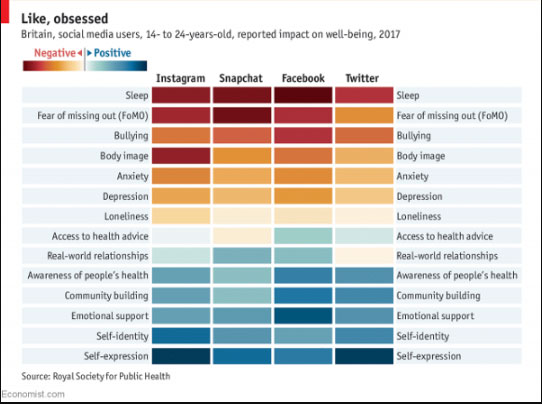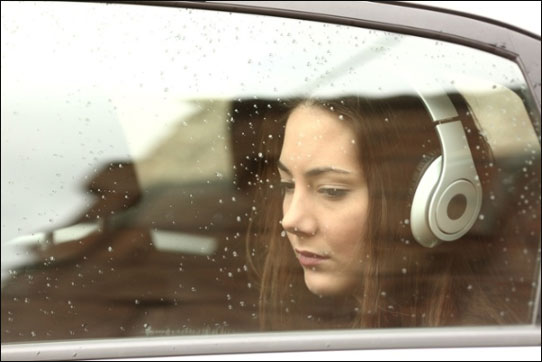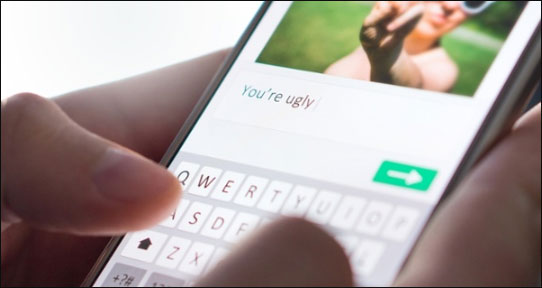FoMo, negativity, anxiety, depression and sleep depravation: “Social” Media
Mental Health Awareness week ended on 20th May but I believe that mental health should be constantly under the spotlight to encourage persistent positive conversation. With this in mind, I decided to take a look at how Social Media plays a role in people’s mental health and wellbeing.
According to The Economist, roughly a quarter of British adults have been diagnosed at some point with a psychiatric disorder which reportedly costs an estimated 4.5% of Gross Domestic Product (GDP) per year. When you look at the numbers, that is equal to roughly £88 billion – 80% of current NHS funding. This is an alarming figure and it is important to look into the root causes of why this might be, starting with the very medium that encourages talking and interaction… the very aptly named “Social” Media.
According to the Royal Society for Public Health:
Social media has become a space in which we form and build relationships, shape self-identity, express ourselves, and learn about the world around us; it is intrinsically linked to mental health.
Social Media has transformed from a place to share stories, updates and experiences into a spotlight-laden podium allowing you to put yourself on show in front of potentially billions of people. This conjures a perilous situation, advocating the promotion of approval seeking and social justification to your actions. Consequently, this spirals further into reward based gratification that Facebook recently admitted to purposefully developing their app to provide (the pull down/refresh feature is extremely similar to a slot machine although the prize is content not cash; and this feature wasn’t an accident).
An experiment by five neuroscientists in 2014 found that Facebook actually triggered the same brain areas that are also activated during episodes of gambling and substance abuse. The issue is that it’s not easy to prove cause and effect (e.g. that a dependence on likes and comments cause the mental illness rather than the other way around). It’s not just Facebook, either. Instagram, Twitter, Snapchat etc all promote elements of behavioural conditioning that implements learned actions that go further than consciousness – we begin to automatically carry out these functions to gain the desired outcomes (more content, more likes, more comments, more retweets, more followers).
The result? A constant need to gain approval by artificial means. And the consequences? Well, where do I begin.

As you can see from the chart above, Instagram, Snapchat, Facebook and Twitter have extremely negative impacts on the amount of sleep that the users are getting. The issue that lies with finding a correlation between sleep depravation and mental health issues is that it is also hard to discover cause and effect. According to Live Science, sleep problems are common in people who also have mental health conditions (including anxiety and depression) but it is likely that the mental health issues are the cause and the sleep issues are a symptom.
But arguably, as per the diagram above; a vast majority of social media users in the UK aged 14-24 reported that social media had a negative impact on sleep but also reported negative impacts on anxiety, depression and loneliness. Perhaps Social Media in large doses is the cause of mental health illnesses that trigger these symptoms? Lead author of the study (mentioned previously) explained the link between sleep depravation and mental health illness:
“How well we sleep might actually play a role in our mental health, if you can sort out your sleep, you could also be taking a significant step forward in tackling a wide range of psychological and emotional problems.”
FoMo
FoMo or “Fear of Missing Out” is the second most negative impact that social media has according to the diagram/survey above. A strange phenomenon, it would be interesting to look back and explore why we get a negative feeling when we feel that we are missing out on something.

Is it the desire to be social? The desire to be accepted or involved in other people’s social situations? A strange paradox for a generation where real world relationships are viewed to have been affected negatively because of social media (how often do you sit around the dinner table for everyone to be sat staring blankly at their mobiles? – probably sat feeling jealous about another social occasion that they aren’t sat on their phone at).
Body Image, Anxiety, Depression and Bullying
Here lies the main issues with our obsession with social media. A perfect storm of approval seeking meets those online trolls that take advantage of the physical barrier between themselves and their targets; fully adopting the psychological phenomenon of deindividualisation (a situation where an individual feels that they are free from consequence due to the inability of them being personally identified).

This concoction of circumstances allow online bullying to take place due to the individual gaining positive reinforcement of their actions (attention, acknowledgement, plaudits from other trolls) and achieving the desired effect of upsetting their target.
How do we, as businesses, combat this?
The solution comes from a multitude of different angles, exploring positivity, inclusion and even constructive criticism as content to fight against the negativity that can be presented from the use of social media. In a world where the source itself is becoming increasingly more important than the facts, an emphasis on positive content creation and story telling is paramount.

As an agency, we want to promote our content and what we do; and we do this through social media but we also want to ensure that social media isn’t all that we are about. What we want to encourage are conversations; constructive dialect that results in a positive outcome for all parties. And we think that all businesses; be that agencies, corporates, companies with a focus on B2B or B2C, or industry influencers; it is your job to encourage people to talk to each other without a screen between them and end this downward spiral of mental health issues that are becoming more and more rife in our country. Google have already implemented features on YouTube to remind users to “take a break” and launched their “Digital wellbeing” website to help people understand their habits online and make positive changes.
The link between mental health issues and social media may be lacking cause and effect but that doesn’t mean we can’t start somewhere by limiting the increase grip that social media has on our lives and mental health.

